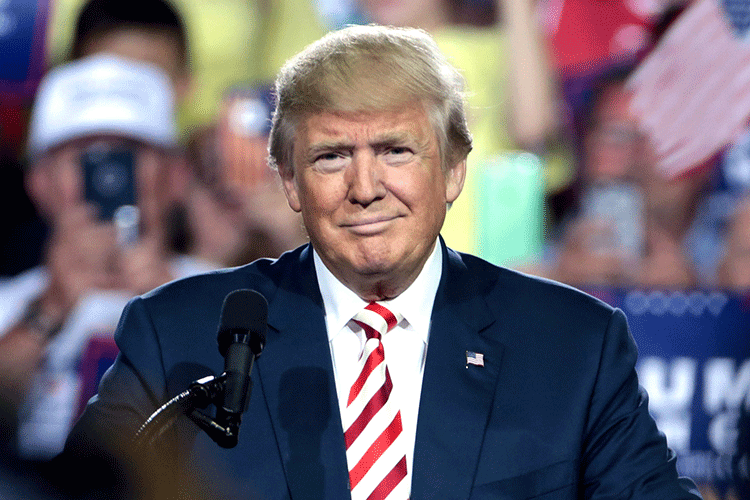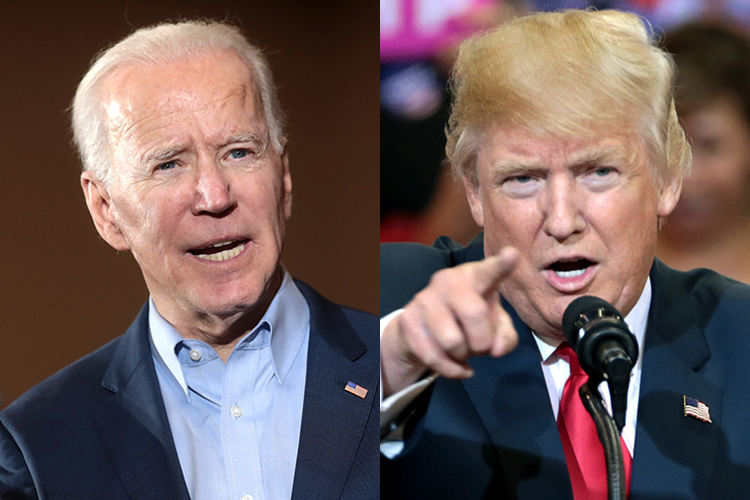Even After New Indictment, Trump Has a Path to the White House, Analyst Says

Two indictments in the past three months have done little to damage former President Donald Trump’s standing among Republican voters, and he still has a clear path to the party’s 2024 nomination and perhaps to the White House, according to a UC Berkeley political analyst.
Last week’s criminal indictment for mishandling top secret information and obstructing the federal investigation has given Trump a political boost, says Dan Schnur, a lecturer at the UC Berkeley Institute for Governmental Studies. But if Trump wins the nomination again, Schnur adds, the indictment is “going to cause real problems” for him in the general election.
Even so, he says, Trump could win in 2024.

Schnur is a veteran of high-level Republican politics. He held key positions in four presidential campaigns and three gubernatorial campaigns; he served under former California Gov. Pete Wilson and later as director of communications for the 2000 presidential campaign of U.S. Sen. John McCain. He currently is registered as “no party preference.”
The U.S. Department of Justice last Friday indicted Trump on 37 counts, charging that he improperly took hundreds of secret documents — some of them related to U.S. nuclear weapons operations and defense vulnerabilities — and kept them in unsecured bathrooms and storage areas at his Florida home. If found guilty, he could face a lengthy prison sentence.
The case is seen as an unprecedented risk to U.S. national security. But Trump, throughout his political career, has largely been able to avoid damage from scandals that would have severely damaged other politicians, Schnur says. Still, he cautions, because the nation is in uncharted waters, predictions about 2024 are especially difficult.
The following Berkeley News interview with Schnur has been edited lightly for length and clarity.
Berkeley News: In the wake of the last week’s indictment, there’s a central question: What impact will this have on Donald Trump’s chances to win the Republican nomination and then reelection as president?
Dan Schnur: Well, the honest answer is that we don’t know how this is going to play out because we’ve never had a president or a presidential campaign front-runner indicted on federal charges before. So, trying to predict what’s going to happen is a little bit reckless.
That said, the early polling shows pretty much what we might have expected, given the dynamic that followed the New York state indictment earlier this spring. It appears that Republicans, to a large degree, are consolidating behind Trump. But this is the type of challenge that’s going to cause real problems for him should he make it to the general election.
We don’t know if that will change, either if Trump is convicted or if additional indictments are leveled.
Let’s unpack that: The conventional wisdom is that almost nothing hurts Trump — he can turn the worst developments to his advantage. But if he’s indicted in the space of a few months for paying hush funds to a porn star, mishandling top-secret documents, and then possibly for trying to manipulate Georgia’s 2020 election outcome — you don’t think all of that will hurt him with Republican voters?
Trump himself several years ago said, famously or infamously, that he could shoot someone on the streets of New York and his most loyal supporters would stay with him. That appears to have been a correct assessment.

That said, the real question here is not whether some of his most loyal backers will stay with him, but rather how big that base is. Conventional wisdom, which holds some validity, suggests that in the Republican Party, about one-third of primary voters will stick with him no matter what. Another third have supported him in the past, but have some misgivings about his candidacy going forward. And then a third are motivated very strongly against him.
So, for the other Republican candidates, the challenge is: How do they convince that middle one-third of the Republican primary electorate? How does a Ron DeSantis or a Nikki Haley or a Mike Pence or a Tim Scott or any of the others peel those voters away from Trump?
We don’t know the answer to that yet.
You suggested that this indictment might help Trump in the short term, but harm him long term. Can you talk a little bit more about that?
Since his election in 2016, Trump and his allies have been on the losing end of three consecutive elections, both in the midterms of 2018 and 2022, and of course, his own campaign against Joe Biden in 2020, where it became clear that he did not have the sufficient base of supporters willing to overlook his various transgressions.
Now, Trump supporters will point out with some validity that the two midterm elections did not feature Trump himself on the ballot. If you take that argument at face value, Trump has won one campaign, and he’s lost one. Both were close, which means there’s a sizable number of Americans who not only are going to vote for him under any circumstances, but will choose him in a contested race.
So the challenge for Biden or someone else who becomes the Democratic nominee — how do they keep the swing voters that Biden won in 2020 from going back to Trump? There are a lot of voters in that category who voted for Trump in 2016 and for Biden in 2020. The most visible cohort of that group are white working-class voters in Rust Belt states who defected from Trump after four years.
What we don’t know is whether they left Trump because he didn’t provide them what they had hoped he would when elected president. Or is it simply because they found Biden to be a more acceptable alternative? That’s going to be the ground on which this fight is waged next year.
There’s a new CBS News poll that shows Republican voters are largely not troubled by this latest indictment, and they’re inclined to stick with the former president. The same poll shows that just 7% of GOP voters have a less favorable view of Trump after the new indictment. That’s a really small number — but is that an important number?
It’s an important number because it shows that most of those Republicans who were going to give up on Trump have already done so. And it’s a relatively small percentage who stuck with him through all the controversies over the years, but for whom this new indictment represents something fundamentally different.
But we don’t know if those numbers would grow in case of a conviction.
More importantly, we don’t know if his numbers will grow if Jack Smith, the special counsel, moves forward with charges relating to Trump’s conduct surrounding the events of Jan. 6.
The legal case regarding the Jan. 6 insurrection changes the political equation?
It’s very clear from the indictment that the documents that Trump took with him to Mar-a-Lago could greatly endanger the safety and security of this country diplomatically, militarily and in all sorts of ways. But the damage that those documents could do is still somewhat theoretical. We don’t know whether any of those documents have fallen into the wrong hands, or whether they’ve caused damage to the United States or its security.

On the other hand, the events of Jan. 6 are not theoretical in the slightest. We’re not talking about potential damage. We’re talking about real, visceral damage that people remember at a much deeper and more emotional level. So, if Smith were to follow up this indictment with charges related to Jan. 6, my guess is that those would have a greater impact on Trump’s level of support.
That said, over the last several years, people like me have been proven wrong on those kinds of suppositions many, many times.
There are now about a dozen candidates running for the Republican presidential nomination, including some very prominent names. Should we read this as a signal that Trump is increasingly seen as vulnerable?
There wouldn’t be this many candidates running if they didn’t think that they could defeat Trump. So there is a sizable portion of the Republican primary electorate that is looking for alternatives.
But a lot of Republicans are worried that a field this large could end up helping Trump much the way it did in 2016, when a large number of opponents split the no-on-Trump vote. It’s worth remembering that Trump won several primaries and caucuses in 2016 with far less than a majority of the vote because the majority was divided between so many candidates.
It’s also important to remember that most of those other candidates back in 2016 never took Trump seriously. They never felt that he could be the nominee. So, while a lot of them were running, they all shied away from direct attacks on him because they assumed he couldn’t win the nomination and that they could be the last person standing, other than Trump.
The biggest difference is that he’s not going to catch the other Republican candidates by surprise the way he did in 2016. We’re already seeing, most notably from Chris Christie (the former New Jersey governor) and Asa Hutchinson (the former Arkansas governor), but also from (former Vice President) Mike Pence and others, a lot more criticism directed toward Trump in this cycle than we did in 2016.
There are pundits who suggest that some of the other candidates may be campaigning essentially to become Trump’s VP nominee. Is that a reasonable assessment?
I don’t see it as a legitimate argument. It’s difficult to see most of these other Republicans in the field having much interest in being vice president.

So, at this point, (Republican U.S. Sen.) Tim Scott and (former South Carolina Gov.) Nikki Haley and Chris Christie and the rest — all are running because they believe they can be the party nominee.
But there’s no way to predict these things in advance, because when a man or woman is offered the second most powerful position in the world, it’s awfully difficult to turn it down, no matter who’s doing the asking.
Trump didn’t win the majority of votes in 2016, but 2018, 2020 and 2022 were all disappointing for him and his faction of the party. Looking forward to November 2024, should we assume that the results are likely to be similar?
Again, if you look at the results of the two previous presidential campaigns in which Trump ran, the one thing we know is how close the results were in both of those races. So, the one very safe prediction to make as we assess the unfolding campaign is that if Trump is the nominee, it will once again be a very close general election.
We’re talking about a very small number of votes that shifted from Trump to Biden in 2020. It would take an equally small number for Trump to regain the White House.
Can you elaborate a bit on how you see Trump’s path to victory in 2024?
Even though Trump’s path to victory is a much more uphill fight than the one he faced in 2016 or in 2020, it’s certainly a very plausible path for him to regain the White House.
In a Republican primary, his opponents would have to split the vote the way his opposition did in 2016, allowing Trump — with a plurality of support within the party rather than the majority — to regain the party’s nomination in a general election. It would require Trump being able to win back some of those white working-class voters who abandoned him for Biden in 2020.
And while at this moment those voters tend to be leaning in Biden’s direction, once again, we’re talking about very small margins. And so while Trump would certainly be the underdog in a rematch between himself and the current president, it’s not hard to see him regaining the White House.
Any closing thoughts?
It’s tempting to try to predict outcomes, but we need to remind ourselves that on unchartered landscape in an unprecedented time, it’s difficult to draw on past results and apply them to current situation.

I believe that a conviction would hurt Trump more than simply the indictment. But we’re not likely to get a conviction between now and the election in 2024. So, the question then becomes, first, can the other Republican candidates draw enough support away from Trump? And second, can Biden hold on to those working-class swing voters who brought him to the White House in 2020?
Most importantly, the question becomes whether Biden can motivate his party’s base. Young people, minority voters and others in the progressive wing of the party — can Biden motivate them to the same degree that he did in 2020?
One of the things that is keeping Biden’s approval rating so low right now is the lack of enthusiasm for him in the Democratic base. So, as the election progresses, you’ll see Biden and the Republicans continue to fight for the political center. But watch just as carefully to see how Biden works to motivate the most loyal Democrats. He can’t afford to have them sitting home in November.